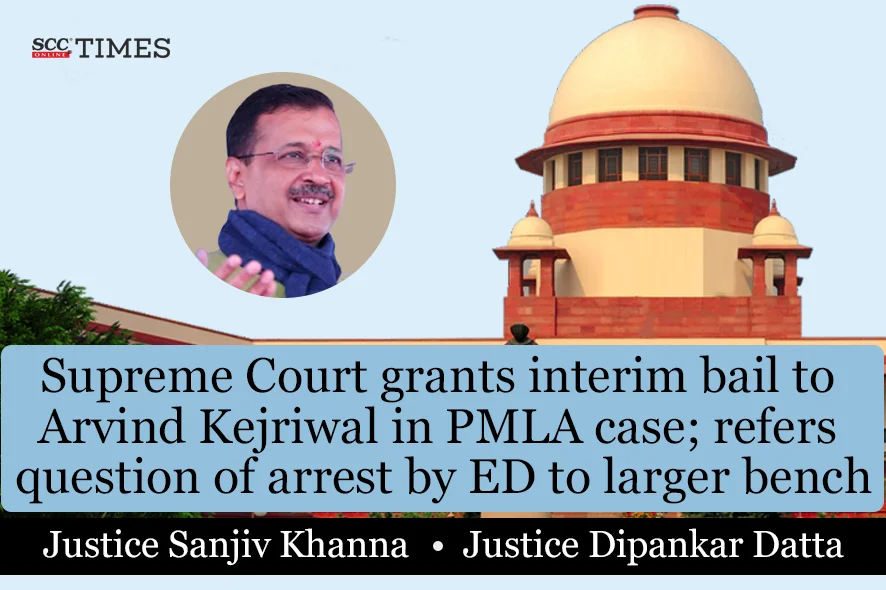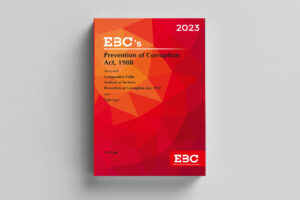Supreme Court: In a criminal appeal by Chief Minister of Delhi and AAP’s leader Arvind Kejriwal challenging his arrest by the Directorate of Enforcement (‘ED’) under the Prevention of Money Laundering Act, 2002 (PMLA) in the alleged Delhi liquor excise policy case, Sanjiv Khanna* and Dipankar Datta, JJ. granted interim relief by granting him interim bail, while referring his petition challenging the arrest by the ED to a larger bench.
The Bench referred following questions to the Larger Bench:
-
Whether the “need and necessity to arrest” is a separate ground to challenge the order of arrest passed in terms of Section 19(1) of the PMLA
-
Whether the “need and necessity to arrest” refers to the satisfaction of formal parameters to arrest and take a person into custody, or it relates to other personal grounds and reasons regarding necessity to arrest a person in the facts and circumstances of the said case?
-
If questions (1) and (2) are answered in the affirmative, what are the parameters and facts that are to be taken into consideration by the Court while examining the question of “need and necessity to arrest”?
Background
The Delhi High Court rejected Kejriwal’s petition under Articles 226 and 227 of the Constitution of India read with Section 482 of the Code of Criminal Procedure, 1973 (‘CrPC’), challenging his arrest by the ED, on the ground of violation of Section 19 of the PMLA, and the proceedings pursuant thereto including the order of remand dated 22-03-2024 to the custody of ED passed by the Special Judge, was rejected. However, in the matter at hand the appeal is not directed against the said decision of the High Court, but impugns the validity of arrest under Section 19 of the PMLA, raising the pivotal question regarding the scope and ambit of the Trial Court/Courts to examine the legality of the arrest under Section 19.
The case involves two parallel investigations by the Central Bureau of Investigation (‘CBI’) and the ED regarding irregularities in the formulation and implementation of the excise policy of the Government of the National Capital Territory of Delhi (GNCTD) for the year 2021-2022. On 17-08-2022, the CBI registered a case for the offences punishable under Section 120-B read with Section 477-A of the Penal Code, 1860 (‘IPC’) and Section 7 of the Prevention of Corruption Act, 1988 on basis of a complaint made by the Lieutenant Governor of the GNCTD, and on the directions of the competent authority conveyed by the Director, Ministry of Home Affairs, Government of India. The chargesheets inter alia alleged that the excise policy, framed for the sale of liquor in NCT of Delhi, was a product of criminal conspiracy, hatched by a cartel of liquor manufacturers, wholesalers and retailers and it provided undue pecuniary gain to public servants and other accused in the conspiracy. It resulted in huge losses to the government exchequer and ultimately to the public. Arvind Kejriwal is not an accused in the said chargesheets.
On 22.08.2022, the ED recorded Enforcement Case Information Report (‘ECIR’) based on offences detailed under the case registered by the CBI. The offences under the CBI case are the predicate offence for investigation/inquiry into the scheduled offences under the PMLA. The ED filed seven supplementary prosecution complaints, and Arvind Kejriwal was named as an accused in the seventh complaint. On 30-10-2023, Kejriwal was issued notice under Section 50 of the PMLA for his appearance and recording of statement. ED’s submitted that Kejriwal failed to appear and join the investigation even after service of eight summons. Kejriwal claimed that the summons and notices under Section 50 were illegal, bad in law and invalid.
The present appeal was based on the ground that Arvind Kejriwal was arrested in violation of Section 19(1) of the PMLA and contended that the arrest was illegal, which makes the order of remand to custody of the ED passed by the Special Court dated 01-04-2024 also illegal.
Section 19 PMLA
The Court said that Section 19 of the PMLA includes inbuilt checks that designated officers must adhere to, firstly, the “reasons to believe” of the alleged involvement of the arrestee have to be recorded in writing; secondly, while affecting the arrest, the reasons shall be furnished to the arrestee and thirdly, a copy of the order of arrest along with the material in possession have to be forwarded to the safe custody of the adjudicating authority. The Court reiterated that arrest under Section 19(1) of the PMLA may occur prior to the filing of the prosecution complaint and before the Special Judge takes cognizance. Till the prosecution complaint is filed, there is no requirement to provide the accused with a copy of the ECIR as it is not a public document.
The Court noted that Vijay Madanlal Choudhary v. UOI, 2022 SCC OnLine SC 929, affirmed the ratio laid down in Union of India v. Padam Narain Aggarwal, (2008) 13 SCC 305 and stated that the safeguards provided as preconditions in Section 19(1) of the PMLA have to be fulfilled by the designated officer before affecting arrest. The safeguards are of a higher standard. They ensure that the designated officer does not act arbitrarily and is made accountable for their judgment about the ‘necessity to arrest’ the person23 alleged to be involved in the offence of money laundering, at the stage before the complaint is filed.
The Court said that as the “reasons to believe” under Section 19(1) are accorded by the authorised officer, the onus to establish satisfaction of the said condition will be on the ED and not on the arrestee and reiterated that the subjective opinion of the arresting officer must be founded and based upon fair and objective consideration of the material, as available with them on the date of arrest. On the reading of the “reasons to believe” the Court must form the ‘secondary opinion’ on the validity of the exercise undertaken for compliance of Section 19(1) of the PMLA when the arrest was made.
The Court stated that the power of judicial review prevails, and the Court/Magistrate is required to examine that the exercise of the power to arrest meets the statutory conditions. The legislature, while imposing strict conditions as preconditions to arrest, was aware that the arrest may be before or prior to initiation of the criminal proceedings/prosecution complaint, it neither explicitly nor impliedly, excludes the Court surveillance and examination of the preconditions of Section 19(1) of the PMLA being satisfied in a particular case. This flows from the mandate of Section 19(3) which requires that the arrestee must be produced within 24 hours and taken to the Special Court, or court of judicial/metropolitan magistrate having jurisdiction. The power of judicial review remains both before and after the filing of criminal proceedings/prosecution complaint.
Distinction between Section 19(1) and Section 45 of PMLA
The Court said that the key distinction between Section 19(1) and Section 45 of PMLA is the authority undertaking the exercise, in each case. Under Section 19(1), it is the designated/authorised officer who records in writing, their “reasons to believe” that the arrestee is ‘guilty’ of an offence under the PMLA. This arrest is based on officer’s opinion, which opinion is open to judicial review. Whereas, under Section 45, it is the Special Court which undertakes the exercise, it independently examines pleas and contentions of both the accused and the ED and arrives at an objective opinion. The Special Court is not bound by the opinion of the designated/authorised officer recorded in the “reasons to believe”. A Court’s opinion is different and cannot be equated to an officer’s opinion. While the Special Court’s opinion is determinative and is only subject to appeal before the higher courts, the ED’s opinion is not in the same category as it is open to judicial review.
‘Reasons to believe’ in Kejriwal’s case
The Court perused the material on record, which indicated the ‘reasons to believe’ for the ED to invoke Section 19(1) of the PMLA in the matter at hand. The Court on perusal of the submissions, clarified that the appeal against an order rejecting the prayer/application for grant of bail under Section 45 of the PMLA was not being decided, but the question of the legality of arrest of Arvind Kejriwal on 21-03-2024 was being adjudicate, exercising the power of judicial review and not merit based review. Regarding consideration of material by the officer forming the opinion, the Court said that a wrong application of law or arbitrary exercise of duty leads to illegality in the process and such decision can be struck down by the Court exercising judicial review and the same would not amount to judicial overreach or interference with the investigation. The Court stated that the legality of the “reasons to believe” must be examined based on what is mentioned and recorded. However, the officer acting under Section 19(1) of the PML Act cannot ignore or not consider the material which exonerates the arrestee. Any such non-consideration would lead to difficult and unacceptable results. First, it would negate the legislative intent which imposes stringent conditions. As a general rule of interpretation, penal provisions must be interpreted strictly. Secondly, any undue indulgence and latitude to the ED will be deleterious to the constitutional values of rule of law and life and liberty of persons. An officer cannot be allowed to selectively pick and choose material implicating the person to be arrested. They must equally apply their mind to other material which absolves and exculpates the arrestee.
The Court clarified that the arguments raised on behalf of Arvind Kejriwal, which tend to dent the statements and material relied upon by the ED in the “reasons to believe”, are propositions or deductions and can be raised at the time when his application for bail is taken up for hearing. Regarding Kejriwal’s contention that “reasons to believe” do not mention and record reasons for “necessity to arrest”, the Court referred to Arnesh Kumar v. State of Bihar, (2014) 8 SCC 273 which lays down that “necessity to arrest” must be considered by an officer before arresting a person. Bail
Considering that Arvind Kejriwal suffered incarceration of over 90 days, the Court directed for his release on interim bail in connection with case ECIR dated 22-08-2022, on the same terms as imposed vide the order dated 10-05-2024, that,
-
he shall furnish bail bonds in the sum of Rs.50,000/- with one surety of the like amount to the satisfaction of the Jail Superintendent;
-
he shall not visit the Office of the Chief Minister and the Delhi Secretariat;
-
he shall be bound by the statement made on his behalf that he shall not sign official files unless it is required and necessary for obtaining clearance/approval of the Lieutenant Governor of Delhi;
-
he will not make any comment regarding his role in the present case; and
-
he will not interact with any of the witnesses and/or have access to any official files connected with the case.
Further, the Court said that Kejriwal is an elected leader and the Chief Minister of Delhi, a post holding importance and influence, and was doubtful whether the Court can direct an elected leader to step down or not function as the Chief Minister or as a Minister, the same was left for Kejriwal to take a call.
Uniform Policy on Arrest by ED
The Court perused the data available ED’s website, as on 31-01-2023, noted that 5,906 ECIRs were recorded, search was conducted in 531 ECIRs by issue of 4,954 search warrants. The total number of ECIRs recorded against ex-MPs, MLAs and MLCs was 176. The number of persons arrested is 513. Whereas the number of prosecution complaints filed is 1,142. The Court said that this data raises several questions, including the question that whether ED formulated a policy, as to when they should arrest a person involved in offences committed under the PMLA. Further, the Court stated that “the principle of parity or equality enshrined under Article 14 of the Constitution cannot be invoked for repeating or multiplying irregularity or illegality. If any advantage or benefit has been wrongly given, another person cannot claim the same advantage as a matter of right on account of the error or mistake. However, this principle may not apply where two or more courses are available to the authorities. The doctrine of need and necessity to arrest possibly accepts the said principle. Section 45 gives primacy to the opinion of the ED when it comes to grant of bail. ED should act uniformly, consistent in conduct, confirming one rule for all.”
CASE DETAILS
|
Citation: Appellants : Respondents : |
Advocates who appeared in this case For Appellant: For Respondent: |
CORAM :












